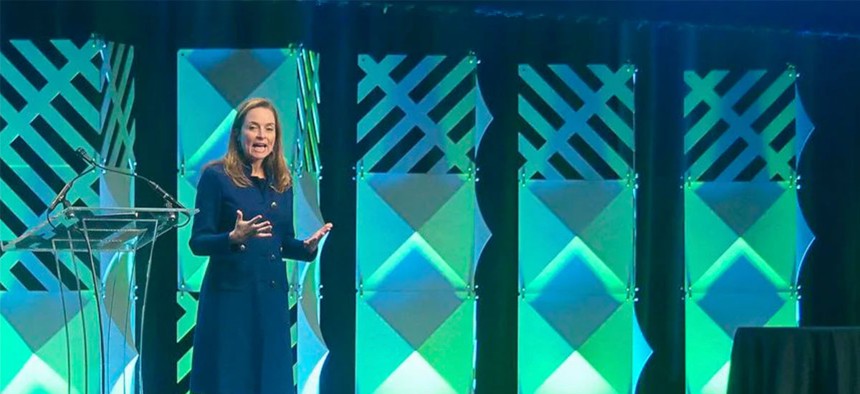
“The federal government needs a viable authority to hire interns to ensure an effective pipeline to sustain the federal workforce," said Margaret Weichert, acting director of the Office of Personnel Management. OPM photo
OPM Proposes Legislation to Clarify Probationary Periods, Expand Hiring Eligibility
The federal government’s HR agency also hopes to remove a cap on interns at federal agencies.
The Office of Personnel Management this spring sent congressional leaders proposed legislation that would clarify the agency’s ability to authorize probationary periods longer than one year and ensure some temporary workers are eligible for permanent federal jobs.
In April, Acting OPM Director Margaret Weichert sent a letter to House Speaker Nancy Pelosi and Vice President Mike Pence, in his capacity as president of the Senate, requesting the legislation. It is unclear when the proposal was published on OPM’s website, but Federal News Network first reported its existence last week.
Weichert wrote that although OPM ostensibly has the ability to consider agency requests to implement probationary periods for new hires longer than the standard one year, two federal appellate court decisions have effectively neutered that authority. Title 5 of the U.S. Code states that federal employees’ due process rights kick in following the completion of a probationary period “or” after an employee “has completed one year of current continuous service” at a federal agency. OPM Proposes replacing the “or” with “and.”
“OPM can provide for longer probationary periods under its current authority, but any practical benefit of this authority is constrained by the current statutory definition of ‘employee,’ which defines when an individual becomes an employee for purposes of receiving procedural due process rights when an agency removes them from the federal service,” Weichert wrote. “Among other things, the [court] decision decisions granted to probationary employees in some cases the full range of employee procedural protections Congress had always reserved for long-time employees.”
OPM on Monday did not immediately respond to a request for comment or a reference to the court decisions.
Another proposal would expedite the process by which employees in temporary or term appointments can apply for permanent positions at federal agencies. Although some agencies already have the authority to consider temporary workers for permanent jobs through merit promotion procedures, Weichert said this measure would codify the practice governmentwide.
“This proposal would recitify the inequities being created through agency-specific statutory authorities for similar flexibilities,” she wrote.
In order to be eligible for a permanent post through the merit promotion process, a term employee must have been hired to their current post through a competitive process, and they must have served at least two years without a break of at least two years. Applicants also must have a record of “acceptable” performance.
The proposal also grants eligibility to former term employees, provided they apply within two years of when they left their temporary position.
OPM also asked Congress to rescind a cap on the hiring of student interns at federal agencies, originally included in the 2019 National Defense Authorization Act.
“Basing the cap on hires made during the previous years, as in the current statute, could produce unintended consequences,” Weichert wrote. “The federal government needs a viable authority to hire interns to ensure an effective pipeline to sustain the federal workforce. Building a pipeline for the federal workforce is critical to agencies’ ability to meet current and future mission needs.”
It is unclear whether lawmakers, particularly in the House, will act on these recommendations. Democrats have bristled at past efforts to extend the length of probationary periods. A spokesperson for Pelosi did not respond to a request for comment Monday.







